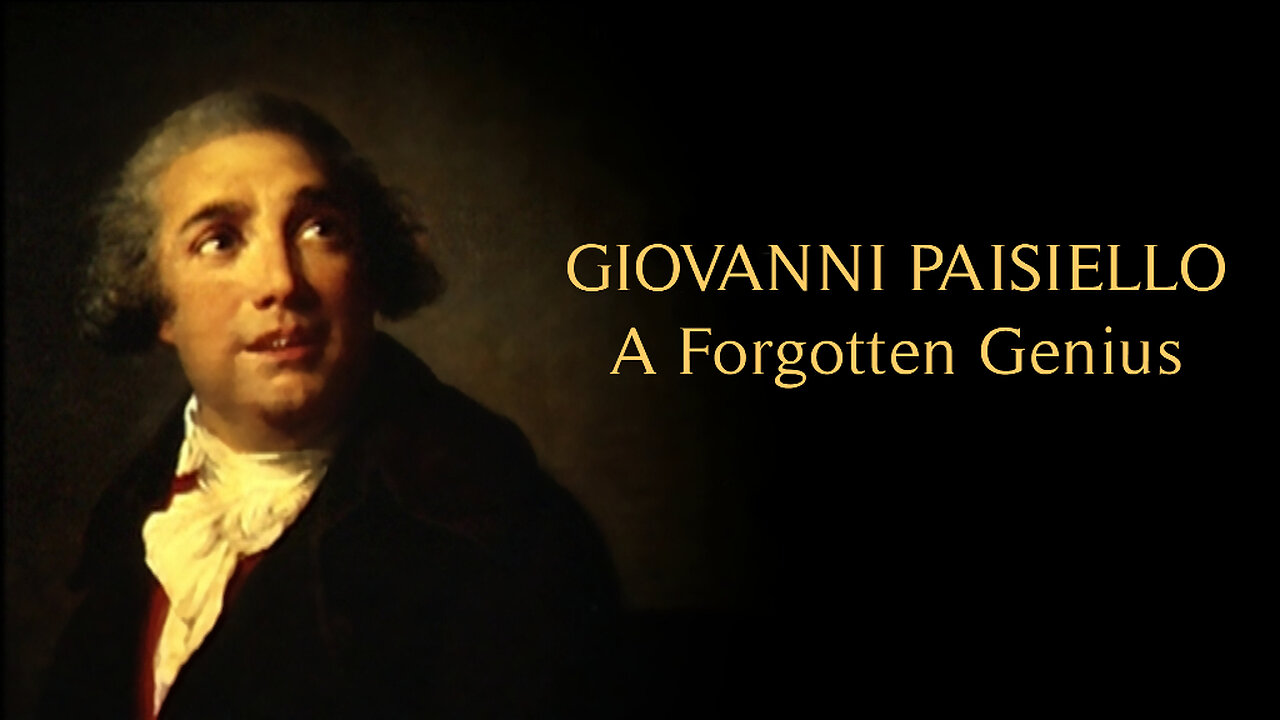Premium Only Content

Giovanni Paisiello - A Forgotten Genius
A 1998 Documentary about the Italian Composer Giovanni Paisiello. Audio various, with English subtitles.
Giovanni Paisiello (or Paesiello; 9 May 1740 – 5 June 1816) was an Italian composer of the Classical era, and was the most popular opera composer of the late 1700s. His operatic style influenced Mozart and Rossini.
Paisiello was born in Taranto in the Apulia region and educated by the Jesuits there. He became known for his beautiful singing voice and in 1754 was sent to the Conservatorio di S. Onofrio at Naples, where he studied under Francesco Durante, and eventually became assistant master. For the theatre of the Conservatorio, which he left in 1763, he wrote some intermezzi, one of which attracted so much notice that he was invited to write two operas, La Pupilla and Il Mondo al Rovescio, for Bologna, and a third, Il Marchese di Tidipano, for Rome. In 1772 Paisiello began to write church music and composed a requiem for Gennara di Borbone, of the reigning dynasty. In 1776 Paisiello was invited by the empress Catherine the Great of Russia to Saint Petersburg, where he remained for eight years, producing, among other charming works, his masterpiece, Il barbiere di Siviglia, which soon attained a European reputation. The fate of this opera marks an epoch in the history of Italian art; for with it the gentle suavity cultivated by the masters of the 18th century died out to make room for the dazzling brilliance of a later period.
When, in 1816, Gioachino Rossini set a revised version of the libretto to music, under the title of Almaviva ossia la inutil precauzione the fans of Paisiello stormed the stage. Rossini's opera, now known as Il barbiere di Siviglia, is now acknowledged as Rossini's greatest work, while Paisiello's opera is only infrequently produced—a strange instance of poetical vengeance since Paisiello himself had many years previously endeavoured to eclipse the fame of Giovanni Battista Pergolesi by resetting the libretto of his famous intermezzo, La serva padrona. Paisiello left Russia in 1784, and, after producing Il Re Teodoro at Vienna, entered the service of Ferdinand IV of Naples, where he composed many of his best operas, including Nina and La Molinara.
Paisiello is known to have composed 94 operas, which are known for their gracefully beautiful melodies. Perhaps the best-known tune he ever wrote is "Nel cor più non mi sento" from La Molinara, immortalized when Beethoven composed piano variations based on it. Paganini also wrote violin variations based on the same tune. Another favourite vocal piece is "Chi vuol la zingarella" from I zingari in fiera, which vividly portrays the scene of an attractive gypsy girl with its dramatic music. Paisiello also wrote a great deal of church music, including eight masses; as well as fifty-one instrumental compositions and many stand-alone songs. He also composed the Inno al Re, the national anthem of the Kingdom of the Two Sicilies. Manuscript scores of many of his operas were presented to the library of the British Museum by Domenico Dragonetti.
The Grove Concise Dictionary of Music notes that "Paisiello was one of the most successful and influential opera composers of his time. Most of his over 80 operas are comic and use a simple, direct and spirited style, latterly with sharper characterization, more colourful scoring and warmer melodies (features that influenced Mozart). His serious operas have less than the conventional amount of virtuoso vocal writing; those for Russia are the closest to Gluck's 'reform' approach.
-
 59:25
59:25
Adaneth - Arts & Literature
4 days agoShirley Verrett (ITA SUB)
56 -
 LIVE
LIVE
The Bubba Army
22 hours agoTrump prepares for MASSIVE bombing! - Bubba the Love Sponge® Show | 6/20/25
1,252 watching -
 LIVE
LIVE
FyrBorne
14 hours ago🔴Warzone Sniping: Is There A Benefit To Keyboard and Mouse Over Aim Assist?
46 watching -
 LIVE
LIVE
DynastyXL
1 hour ago🔥 LIVE from Verdansk – Warzone Season 4 Begins! 🎯 GOAL 45 / 100 FOLLOWERS 🔥
83 watching -
 11:28
11:28
The Art of Improvement
20 hours ago $1.00 earned5 Small Habits That Have a Giant Return on Life
3.8K2 -
 13:50
13:50
Sugar Spun Run
1 day ago $1.57 earnedBlack Bottom Cookies
8.78K2 -
 9:32
9:32
CarlCrusher
1 day agoTic Tac UFO | Hurricane, Utah 2025 | Carl Crusher Psionic Contact Method
6.39K6 -
 13:33
13:33
IsaacButterfield
1 day ago $1.83 earnedLEAVE VEGAN BOOTY ALONE!
11.3K9 -
 2:15:13
2:15:13
Side Scrollers Podcast
21 hours agoNintendo BRICKS Switch 2s, Roblox ICE Protest Update, Man PROPOSES to AI | Side Scrollers Live
8.68K7 -
 56:50
56:50
SinCityCrypto
19 hours ago $1.15 earnedBitcoin Consolidates as Ai Crypto Takes Off!
11.2K4